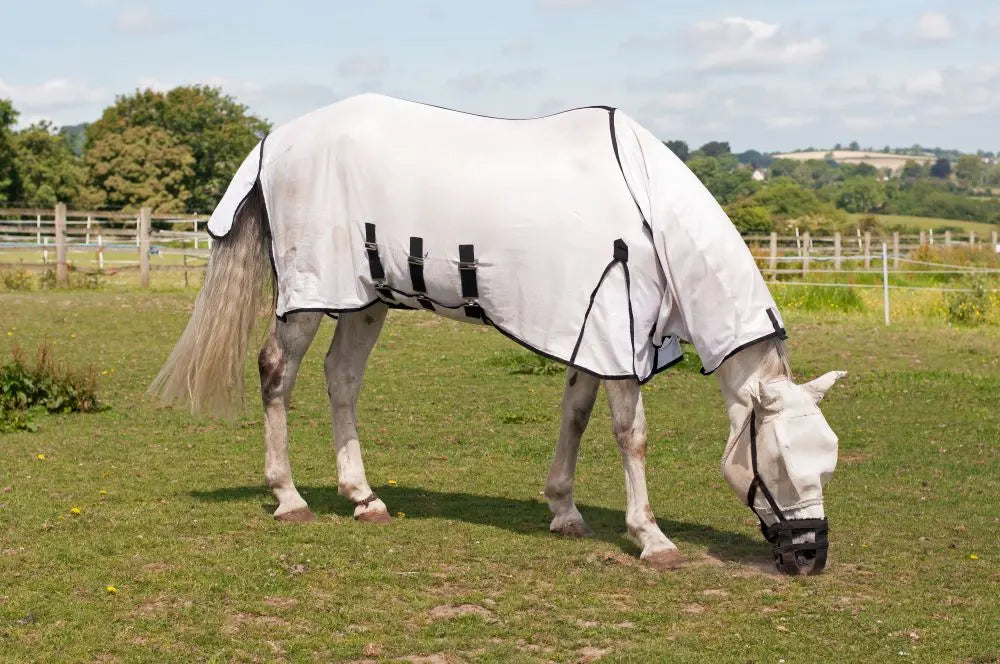From £6.99

Summer Horse Care Tips Every Equestrian Should Know
With the summer season in full swing, it is important to consider the specific needs of horses during this time of year. As an equestrian, understanding summer horse care can help to ensure your horse's health and wellbeing during the warmer months. From preparing for the heat to managing bugs and pests, it is essential to be aware of the various aspects of horse care in the summertime. This blog post will provide tips and advice on how to properly care for your horse during the summer season.
Check your horse's feet regularly
Summer is the perfect time for your horse to enjoy grazing and turnout. However, this means that their hooves are more susceptible to damage and potential horse problems. Keep a close eye on your horse's feet by regularly checking for any cuts, bruises, or heat. These signs could indicate an underlying issue, and early detection could save your horse from a more serious horse health problem.
Moreover, summer is also the time when horse flies and other biting insects are at their peak. These insects can cause your horse to stomp their feet frequently, which can lead to hoof damage and other horse problems. By checking your horse's feet regularly, you can quickly spot and treat any problems that may arise.
Therefore, it is essential to maintain good hoof hygiene during summer. This includes picking out your horse's hooves daily to remove any debris and dirt. Additionally, consider applying a hoof moisturizer to keep your horse's hooves healthy and moisturized. Regular hoof care can prevent many potential horse health problems and ensure that your horse is comfortable throughout the summer season.
Keep an eye out for sweet itch
During the summer months, one of the most common issues for horses in the UK is sweet itch. This is a condition caused by an allergic reaction to the saliva of biting insects, especially horse flies. As a result, horses may develop itchy, scaly, and sore patches on their skin. If you notice your horse rubbing or biting its skin, especially around the mane and tail, it may be a sign of sweet itch.
To prevent or treat sweet itch, there are several measures you can take. First, try to reduce the exposure of your horse to horse flies and other biting insects by using fly sheets, fly masks, or fly repellent sprays. You can also install fly traps or fly predators around the stable or paddock. Another option is to provide your horse with a shady spot where it can rest during the hottest hours of the day, as horse flies tend to be more active in the sun.
If your horse already has sweet itch, you may need to apply a topical ointment or cream to soothe the skin and prevent further damage. Some natural remedies that can help relieve sweet itch symptoms include aloe vera gel, tea tree oil, or chamomile. However, it's important to consult with your vet before trying any new treatment, as some products may be too harsh or may interact with other medications.
Overall, sweet itch can be a frustrating and uncomfortable condition for both horses and their owners. By keeping an eye out for the signs and taking preventive measures, you can ensure that your horse stays healthy and happy throughout the summer season.
Change your horse's rug according to the weather
When it comes to summer horse care in the UK, it's important to remember that the weather can be unpredictable. One minute it's hot and sunny, the next it's pouring with rain and there's a chill in the air. That's why it's essential to keep an eye on the forecast and change your horse's rug accordingly.
In the warmer months, your horse is likely to spend more time outside and will need a lighter rug to keep them comfortable. Opt for a rug made from breathable material that will allow your horse to regulate their body temperature naturally. This will help prevent them from overheating and sweating excessively, which can lead to skin irritations and infections. However, summer can also bring with it a new set of challenges for horse owners, such as horse flys. These pesky insects can make life miserable for horses, causing them to stamp their feet, shake their heads and even become agitated. To combat horse flys, consider investing in a rug with a built-in fly sheet or adding a fly rug over your horse's regular rug. This will help keep them protected and comfortable while grazing or out in the field.
Remember, it's essential to monitor your horse's behaviour and condition regularly. If they seem uncomfortable or are exhibiting unusual symptoms, such as itching or rubbing, it's time to reassess their rug and make any necessary changes. By paying close attention to your horse's needs and taking the appropriate steps, you can ensure they remain healthy, happy and comfortable throughout the summer months.
Make sure your horse has access to plenty of water
In the summer months, horses are at an increased risk of dehydration, so it is essential to make sure your horse has access to plenty of clean, fresh water at all times. As the temperature rises, horses need more water to maintain their body temperature, regulate their digestion, and prevent heat stroke.
Ensure that your horse has access to a constant supply of fresh water throughout the day. Check their water source regularly and clean out any algae or debris that may have built up in the water container. Also, consider providing a salt block for your horse, which can help to encourage them to drink more water.
It's also important to monitor your horse's water intake to ensure they are drinking enough. A healthy adult horse should drink between 5-10 gallons of water per day, depending on their size and activity level. If you notice that your horse is drinking less than usual, or if they seem lethargic or have a dry nose, this could be a sign of dehydration, and you should contact your veterinarian immediately.
In addition to providing ample water, consider offering water-rich foods to your horse, such as fresh fruits and vegetables, to help keep them hydrated and healthy throughout the summer months. By taking the time to ensure that your horse has access to plenty of water, you can help to keep them cool, comfortable, and healthy all season long.
Consider fly sprays and other insect repellents
Summer is a time when insects and bugs come out in full force, which can be quite annoying and potentially harmful to your horse. Mosquitoes, flies, ticks, and other pests can cause irritation and discomfort, as well as carry diseases. Therefore, it's crucial to protect your horse from these nuisances by using effective fly sprays and other insect repellents.
There are many different types of insect repellents on the market, ranging from sprays, lotions, and gels to wipes and collars. Some of these products contain natural ingredients like citronella, eucalyptus, and lavender, while others use synthetic chemicals such as DEET or pyrethrin. Whatever product you choose, make sure to follow the instructions carefully and apply it according to your horse's needs.
It's worth noting that not all horses react the same way to insect repellents. Some may be more sensitive or allergic to certain ingredients, while others may require more frequent applications. It's essential to observe your horse's behaviour and skin condition after applying any repellent, and adjust accordingly.
Apart from using insect repellents, there are other ways to minimize your horse's exposure to bugs. For instance, you can install fans or fly screens in the stable to keep the air circulating and prevent insects from entering. You can also use fly masks and leg wraps to cover your horse's sensitive areas, such as the eyes, ears, and lower legs.
In summary, summer horse care should include protecting your horse from insect bites and infestations. By considering fly sprays and other insect repellents, you can help your horse stay comfortable and healthy during the hot months. Remember to use products that are safe, effective, and appropriate for your horse's individual needs.
